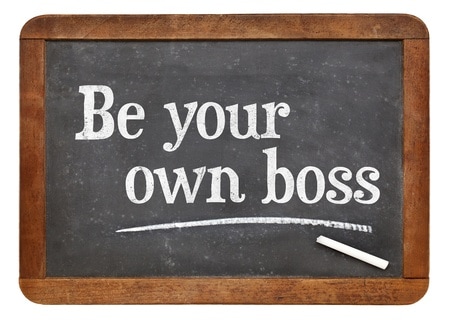Do you resent working hard only for someone else to reap the rewards of your efforts?!
Start 2017 with a new resolve ...
Setting up as a sole trader, or starting your own small business can seem like an ideal solution, and speaking from experience, it definitely does have a number of advantages! It’s by no means the ‘easy option’ though; I am sure that everyone who falls into the self-employment category has the odd bad day when they would like to give it all up and return to the world of employment. Thankfully, those days, for me, are few and far between… but they are there!
Starting your own small business shouldn’t be done on a whim.
This is a decision that could have a significant impact on your financial future, and therefore requires careful planning and research before you make the leap. Thinking of working in a specific field? Try talking to someone who is already working in that field (or a similar one if you feel uncomfortable talking to potential future competitors), and ask them about their business: how they started, how long it took for them to gain a comfortable number of customers, what they did to attract customers, etc. Hopefully they will be honest and not ‘sugar coat’ their responses too much!
Who are your competitors?
You will also need to research the market that you wish to become a part of, identifying your competitors as well as your potential customers. This is important to consider – if the market you are working in is already saturated with similar businesses, it is going to be much harder to find customers unless you are able to offer them something revolutionary, or much cheaper than the comparable services offered by your competitors. You also don’t want to undervalue the work that you do – by undercutting your competitors, you may win customers in the short term, but you will find yourself working exceptionally hard for a significantly reduced financial gain in the long term.
Look for trustworthy and reliable partners
During this research, it is also important to look for trustworthy and reliable partners and suppliers, and carefully set out a realistic business plan to start working towards. Unless you already have contacts in your new field of work, you aren’t necessarily going to hit the ground running with your new business – it may be a long and slow process involving a significant amount of networking before you have enough clients to ‘make ends meet’: are you financially prepared for this eventuality? If the answer is no, perhaps you need to build up a savings ‘buffer’ before you take the plunge.
Register your new business and take advice
Once you have done your research, and are ready to start your new business, one of the first things that you need to do is register with HMRC in order to avoid the risk of financial penalties if you are found to be trading without being registered for Tax and National Insurance. The gov.uk website provides a great deal of advice about registering with the HMRC, whether you are setting up as a Sole Trader, or as a limited company – take a look at the government website for comprehensive advice and guidance.
Do you have appropriate business insurance?
Another job to carry out early on in your self-employment journey is to ensure that you have the appropriate insurance for your Business – including Public Liability Insurance and/or Professional Indemnity Insurance. Stepping away from the comfort of ‘regular’ employment, where employees are often protected by a legal support team, you can often feel alone and isolated if issues arise when you are self-employed. By ensuring that you are insured correctly, if there is a problem with a customer or supplier, this is far more easily dealt with than if you do not have sufficient insurance. To learn more about Professional Indemnity Insurance, take a look at the Simply Business Website - they have a very informative video that explains why it is an essential purchase for any self-employed person.
Other things to put in place:
- A business Website/registered domain - maybe you can create a Website yourself?
- Equipment - Computer/Laptop/iPad/Printer/Scanner/Copier
- Exchange email
- Business phone line
- A business logo - maybe you can design yourself?
- Business cards
- Social media profiles (LinkedIn, Facebook, Twitter, Google+, GoogleMyBusiness, Instagram, Pinterest - there are so many to consider!)
- Data protection registration
- Business support:
- IT Support (with Search Engine Optimisation for your Website)
- Bookkeeper
- Accountant
- Administrative/business support (maybe a VA!)
- Social media management
- Marketing
- Call Handling
This blog lists just a few of the things that you need to consider if you are setting up your own small business – it is by no means a comprehensive list, but there is plenty of advice and support out there on the internet if you are looking for more information. I just wanted to convey the fact that working for yourself is an incredibly rewarding experience, but that it requires a great deal of careful consideration and planning if you want to find success.
Whether you decide that self-employment is the path for you or not – good luck!
Enjoy the journey! Clare


 RSS Feed
RSS Feed
